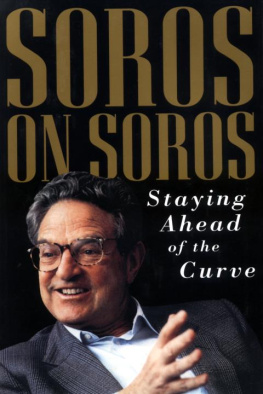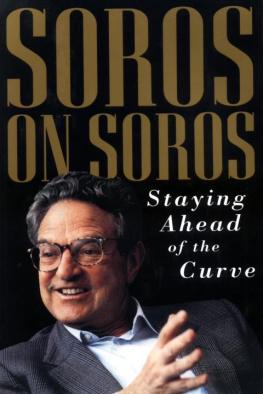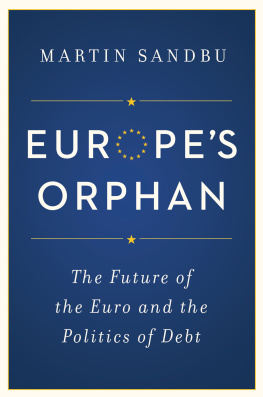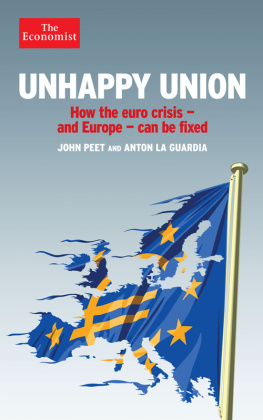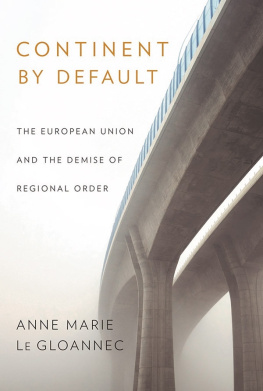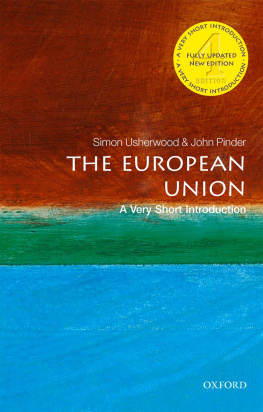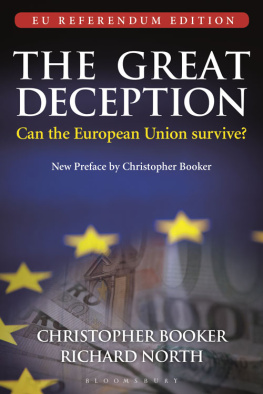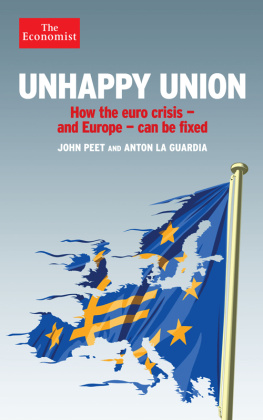The Tragedy of the European Union
ALSO BY GEORGE SOROS
Financial Turmoil in the United States and Europe: Essays
The Soros Lectures at the Central European University
The Crash of 2008 and What It Means:
The New Paradigm for Financial Markets
The New Paradigm for Financial Markets:
The Credit Crisis and What It Means
The Age of Fallibility: Consequences of the War on Terror
Open Society: Reforming Global Capitalism
The Crisis of Global Capitalism: Open Society Endangered


Copyright 2014 by George Soros and Gregor Peter Schmitz
Published in the United States by PublicAffairs,
a Member of the Perseus Books Group
All rights reserved.
No part of this book may be reproduced in any manner whatsoever without written permission except in the case of brief quotations embodied in critical articles and reviews. For information, address PublicAffairs, 250 West 57th Street, 15th Floor, New York, NY 10107.
PublicAffairs books are available at special discounts for bulk purchases in the US by corporations, institutions, and other organizations. For more information, please contact the Special Markets Department at the Perseus Books Group, 2300 Chestnut Street, Suite 200, Philadelphia, PA 19103, call (800) 810-4145, ext. 5000, or e-mail .
BOOK DESIGN BY JENNY DOSSIN
The appendix Fallibility, Reflexivity, and the Human Uncertainty Principle, originally appeared in the Journal of Economic Methodology, January 2014, and is reprinted by permission of the publisher, Taylor & Francis Ltd, www.tandfonline.com.
Library of Congress Cataloging-in-Publication Data Soros, George.
The tragedy of the european union: disintegration or revival? / George Soros with Gregor Peter Schmitz.
pages cm
ISBN 978-1-61039-422-2 (ebook)
1. European Union countriesEconomic policy. 2. European Union countriesEconomic conditions. 3. European Union countriesPolitics and government. 4. European Union.
I. Schmitz, Gregor Peter. II. Title.
HC240.S654 2014
337.142dc23
2013049858
FIRST EDITION
1 3 5 7 9 10 8 6 4 2
For Tamiko,
without whom this book would not have been possible.
Contents
Is it too late to save the European Union? In January 1999, when the euro was created, the single currency project looked like the most decisive step toward Europes ever closer union, a process that began with the Treaty of Rome in the aftermath of the Second World War. The euro was supposed to create a unified continental economy that would rival the United States in its economic dynamism and financial stability. It was designed to eradicate the economic divergences that contributed to what Winston Churchill described as Europes Thirty-Year Civil War from 1914 to 1945. And it was supposed to make the EU an even more inspiring model, at the point in history when the Soviet empire was collapsing and the time seemed ripe for new geopolitical arrangements based on mutual economic benefit and democratic cooperation, instead of coercion by imperial powers.
Fifteen years later, it is obvious that this project has gone badly wrong. Xenophobic and neo-fascist movements have gained unprecedented support in the run up to the 2014 European elections. Britain is planning an EU exit referendum. And all over Europe national interests are perceived to be in conflict as governments respond to anti-EU sentiment among their voters. This reversal of European integration is clearly linked to the euro and the global financial crisis. But what exactly went wrong and can it be put right?
If anyone can offer an authoritative answer, it is George Soros. The Tragedy of the European Union is deftly organized in a series of in-depth interviews conducted over several months in 2013 by Gregor Peter Schmitz, Europe Correspondent for Der Spiegel, one of Europes leading news-magazines. Soross insights, not just on Europe but also on global economic politics and financial markets, are uniquely valuable for three mutually reinforcing reasons: Firstly, because the disintegration of once-great nations and empires is often triggered by financial crises. And nobody understands crises better than Soros. As the worlds pre-eminent currency speculator, Soros has shown repeatedly that he understands the interaction of markets and politics better than the people who run finance ministries and central banks. Bolstered by Schmitzs introduction, which astutely frames the major themes and offers context, the interviews in this book present Soross insightsmainly about Europe, but also about the US, China, the Middle East, and elsewherewith unprecedented clarity by focusing on specific personal experiences and historical events. Because of his astonishing investment record, his views on finance and economics are always in demand around the world.
But there are two other reasons why Soross comments in this book could have a greater effect than usual, especially on European policy debates. While Soros has achieved fame as the worlds most successful financial speculator, if he is remembered by history it will not be just for making his $20 billion fortune, but for spending it. By creating his Open Society foundations, Soros helped to tear down the Iron Curtain, demolish the Berlin Wall, and overthrow the communist dictatorships of Eastern Europe and the Soviet Union. Because of his decades of direct engagement in both politics and finance, he brings a personal insight to his analysis that few other commentators, or even politicians, can match.
Soros explains that his faith in the EU goal of ever-closer union was inspired by his father, who insisted, even in the midst of the Nazi holocaust, that they should bear no personal grudge against the German people as a whole. Unlike the British euro-sceptics or German conservative economists, who always believed that the single currency was doomed to failure, Soros expected the euro to succeed. For him, the euro crisis was not an inevitable consequence of over-ambitious integration, but a result of avoidable blunders and misunderstandings in politics, economics, and finance.
This emphasis on flawed understanding points to a third feature of Soross thinking that makes his analysis unique. Soros presents both the euro crisis and the financial collapse related to Lehman Brothers as classic examples of reflexivitya process by which flawed economic or political theories become so powerful that they alter the social realities they are supposed to describe. This interference between perceptions and realities creates waves of instability in markets and political systems that few economists or politicians properly understand. Soros attributes his financial success mainly to focusing on reflexivity, and he uses this concept to diagnose the flaws of the euro project as well as to explain the US banking collapse.
In both cases, a misguided economic theorythe excessive faith in the self-regulating financial markets that Soros calls market fundamentalisminspired flawed institutional structures. In Europe, the key institutional flaw was the Maastricht Treaty; in the US it was the excessive reliance on badly designed synthetic financial instruments like collateralized debt obligations and credit default swaps. The false economic theories embodied in these structures changed economic and financial conditions, setting up boom-bust cycles of initial over-performance and over-confidence, followed by self-reinforcing collapse. Because reflexivity is so central to Soross perspective, this book includes an article from the latest issue of the
Next page

